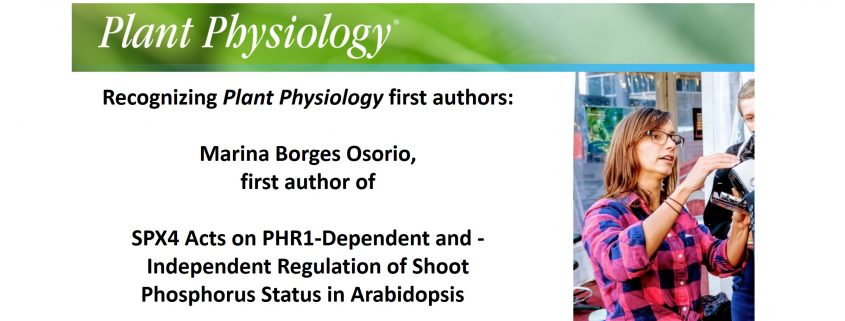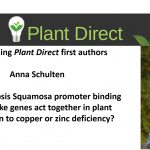Recognizing Plant Physiology first authors: Marina Borges Osorio
Marina Borges Osorio, first author of SPX4 Acts on PHR1-Dependent and -Independent Regulation of Shoot Phosphorus Status in Arabidopsis
Education: PhD in Botany, La Trobe University, Australia (2018); MSc in Genetics and Molecular Biology, UFRGS, Brazil (2010); BSc in Biological Sciences, UFPEL, Brazil (2007)
Non-scientific Interests: arts and sports
Brief bio: I am a plant scientist from Brazil who has recently completed a PhD in Botany at the Department of Animal, Plant and Soil Sciences, La Trobe University, in Melbourne. I am enthusiastic about science in general, but my special interest is in the molecular basis of plant responses to environmental cues.
During my masters, I have focused on the molecular mechanisms involved in plant-pathogen interactions, more specifically exploring the role of the WRKY family of transcription factors in soybean’s defense against pathogens. I was then awarded an Endeavour Postgraduate Scholarship, which allowed me to expand my horizons and move to Australia for a PhD in 2011. Back then, I started by studying the molecular interface between plant biotic and abiotic stresses, more specifically, the interaction between phosphite and phosphorus nutrition in determining plants’ susceptibility to oomycetes. Change of winds have led me to change cities and projects, and focus exclusively on the nutrition side of the story. I joined the group of Prof Jim Whelan in the Australian Research Council’s Centre of Excellence in Plant Energy Biology. For the past four years, I have been using the Arabidopsis model to investigate how plants sense fluctuations in intracellular phosphate availability, paying particular attention to the role of the SPX4 protein in shoots.
I am also passionate about celebrating science and bridging the gap between science and society. As such, on the side of my PhD, I got involved in multiple science education and outreach activities. These include school and university workshops, as well as activities in museums and public events. As a fresh graduate, I am currently looking for work opportunities, especially involving plant science and community engagement. It would be particularly interesting to develop projects aiming to boost the reach and the impact of plant science research on society.




